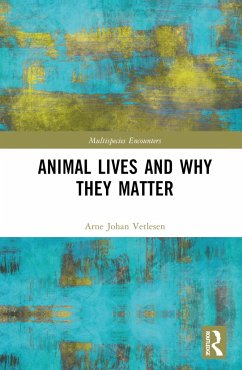
Animal Lives and Why They Matter
Versandkostenfrei!
Versandfertig in 6-10 Tagen
45,99 €
inkl. MwSt.
Weitere Ausgaben:

PAYBACK Punkte
23 °P sammeln!
This book engages with the changing ways in which we, as a society and culture, look upon and interact with animals, stressing how much animals differ among themselves. An invitation to appreciate the peculiar role of animals in telling important if uncomfortable truths about who we are and where we are heading - namely, towards a world so much poorer in cultural, moral, and biological diversity - as a result of the ongoing decimation of so many other species. Drawing on a variety of thought ranging from that of Midgley, Plumwood, and Murdoch to Levinas, Derrida, and Habermas, from ecophilosop...
This book engages with the changing ways in which we, as a society and culture, look upon and interact with animals, stressing how much animals differ among themselves. An invitation to appreciate the peculiar role of animals in telling important if uncomfortable truths about who we are and where we are heading - namely, towards a world so much poorer in cultural, moral, and biological diversity - as a result of the ongoing decimation of so many other species. Drawing on a variety of thought ranging from that of Midgley, Plumwood, and Murdoch to Levinas, Derrida, and Habermas, from ecophilosophers to conservation biologists, Animal Lives and Why They Matter asks how we have come to this, and what an alternative, less destructive approach to our now precarious coexistence with animals might look like. Spanning the disciplines of philosophy, psychology, and anthropology, this enquiry into various cross-species relationships and encounters will appeal to scholars and students across the humanities and social sciences with interests in philosophy, ethics, human-animal interaction, and environmental thought.














